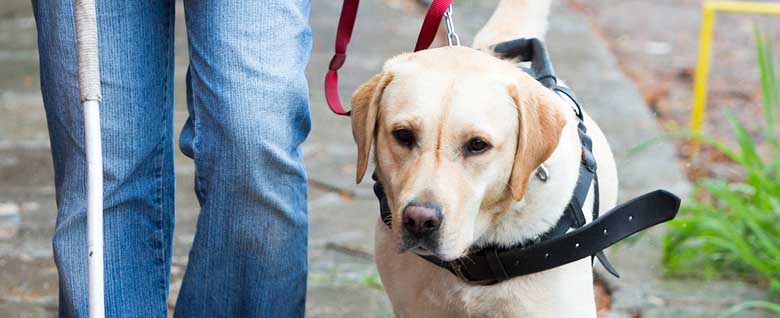A leading discrimination lawyer is warning that a growing number of businesses and organisations are flouting equality legislation by refusing access to users of guide dogs and assistance dogs.
Maria Chadwick, a partner at Stephensons has seen a 40% increase in discrimination claims considered and brought against businesses and service providers from users of guide dogs and assistance dogs over the past few years.
Working guide dogs have had the legal right to enter public places including restaurants, shops and taxis for 27 years, but these owners and owners of assistance dogs regularly face access refusals from businesses and service providers.
The warning from Stephensons comes as the charity Guide Dogs launches its ‘Open Doors’ campaign. Their research found that the majority (81 per cent) of guide dog owners responding to a recent survey have been illegally refused entry to a business or service, because they were with their guide dog.
And of these people, almost three quarters (73 per cent) said they experienced an access refusal at least once in the past 12 months.
Under the Equality Act 2010, service providers, including higher and further education providers, businesses providing taxi/transport service and hospitality services such as restaurants, are prohibited from discriminating against those who need an assistance dog with them by refusing access to their services. The Act also goes further, requiring service providers to make reasonable adjustments to any physical feature of their premises, or features of other arrangements and aspects of their service, to prevent a substantial disadvantage being caused to the disabled customer.
A business found by a court to be in breach of these statutory duties and obligations will face the possibility of being subject to significant sanctions. They could be ordered to pay significant financial damages to the customer, or subject to injunctive orders requiring them to take action to ensure that customers are protected from such detriment in the future, declarations that they have discriminated against their customers and orders to pay the customer’s legal costs of bringing the claim. Such judgments would undoubtedly cause devastating reputational damage and extensive financial costs to the business.
Maria Chadwick, partner and head of the discrimination law department at Stephensons said: “Despite legislation, some businesses overlook this completely and introduce their own self-styled door policy or practices which exclude users of guide dogs and assistance dogs from accessing their services. This is clearly illegal and a worrying trend that needs addressing urgently.
Whilst many victims of discrimination will make an informal complaint to the service provider at the time of the incident, often those complaints aren’t handled sufficiently, prompting people to look at more formal routes of redress and ultimately legal action.”
Helen Honstvet, senior policy, public affairs and campaigns manager, at Guide Dogs added: “Guide dog owners deserve to be able to live their lives the way they want and feel confident, independent, and supported in the world. The law is clear, and yet guide dog owners continue to experience access refusals, which are almost always illegal.
“As part of High Street Heroes, our campaigners will be having thousands of conversations with shops and businesses about how they can support assistance dog owners. We know that many businesses welcome guide dog owners but being refused access to a business or service has a negative impact beyond the moment the refusal occurs. That is why businesses and services need to do more to ensure they have open doors to guide dog owners.”


